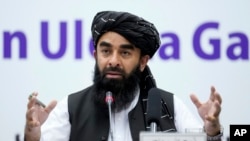The Taliban on Wednesday said their decision to forbid local women from working for the United Nations in Afghanistan is an internal matter that all parties should respect.
The fundamentalist de facto authorities issued their first formal response a week after the ban on Afghan women staff from the U.N. went into effect. It also came a day after the U.N. mission office in Kabul renewed its condemnation of the "unlawful" restriction and warned it could push the world body to cease operations in the country.
"The Islamic Emirate does not want to create obstacles for the United Nations," chief Taliban spokesman Zabihullah Mujahid said in a statement Wednesday, using the official title for his male-only government.
"Rather, it wants to make it clear that this is an internal issue of Afghanistan, which does not create a problem for anyone and should be respected by all sides," Mujahid added.
U.N. Deputy-Secretary General Amina Mohammed said Wednesday on Twitter that “Giving up on women's rights in Afghanistan is simply not an option.”
The mission noted in a statement that its chief, Roza Otunbayeva, had initiated a review of U.N. operations in Afghanistan that could continue until May 5, instructing all staff to stay away from work during this period.
The United Nations said on Tuesday that it could not comply with the ban on its Afghan female staff as it violates its charter and international law.
The U.N. has nearly 4,000 staff members in Afghanistan, of which about 3,300 are Afghans. Among them are about 400 Afghan women and 200 international female staffers.
Last December, the Taliban banned local female employees from working with domestic and international aid organizations, prompting some to suspend their charity work.
The United Nations has said that the Taliban administration would be responsible for "any negative consequences of this crisis" stemming from the ban for millions of Afghans across the country reeling from years of war and prolonged drought.
In his statement, Mujahid instead blamed Western governments for the humanitarian crisis in Afghanistan, calling it an outcome of international sanctions on the country's financial and banking system, the freezing of central bank assets overseas, and travel bans on Taliban leaders.
He said removing all restrictions would put Afghanistan on the path to economic and political progress. "Afghans have the capacity to stand on their own feet," Mujahid said.
Afghanistan is home to one of the world's largest humanitarian crises. The United Nations says 28.3 million people, or two-thirds of the population, need humanitarian assistance. Six million people are on the brink of famine.
This year's $4.6 billion humanitarian appeal has received little more than $200 million in funding.
The U.N. humanitarian agency warned Wednesday that funding for the Afghan appeal is drying up, putting millions of lives at risk. "If funding is not urgently secured, millions of Afghans will be staring down the barrel of famine, disease, and death."
Aid workers fear the Taliban's crackdown on women aid workers could further undermine the U.N. appeal and even force donors to suspend support for the humanitarian assistance program in Afghanistan.
The ban on U.N. female staff is the latest in a series of restrictions the Taliban have imposed on Afghan women since reclaiming control of the country in August 2021. They have barred women from accessing higher education, government jobs, and public spaces. Girls are also not allowed to attend school beyond sixth grade.
The hardline group rejects criticism of its governance, saying it aligns with Afghan culture and Islamic law. The restrictions have kept the world from granting legitimacy to the Taliban rule.







